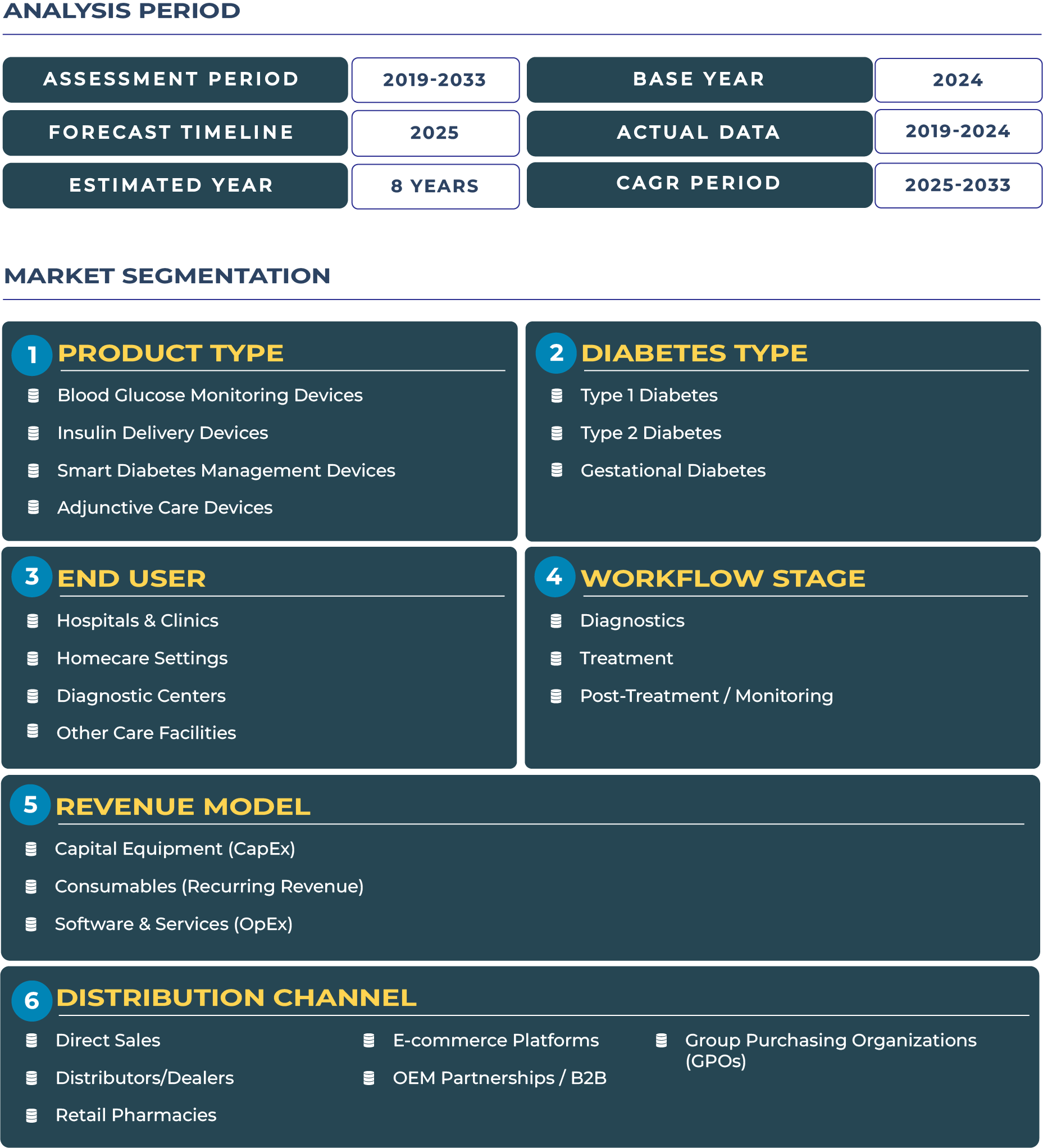Brazil Diabetes Care Devices Market Outlook: Harnessing Local Manufacturing to Unlock Growth Potential
The Brazil diabetes care devices market is at a pivotal moment, where the intersection of local manufacturing, regulatory reforms, and the growing need for cost-effective solutions will shape its trajectory over the next decade. Brazil faces unique challenges due to tariffs, import dependencies, and price sensitivities across healthcare infrastructure. Introducing local production strategies is not just a market adaptation but a necessity to manage costs, reduce tariffs, and make advanced technologies like continuous glucose monitoring (CGM) and insulin delivery systems more accessible to a broad population base. This structural shift complements Brazil’s broader industrial policies while positioning the diabetes care devices industry as a critical healthcare sector contributing to better outcomes for a growing diabetic population.
Brazil is set to remain the largest diabetes care devices market in Latin America, with the market projected to grow from USD 474.0 million in 2025 to USD 753.3 million by 2033, reflecting a CAGR of 6.0% (2025–2033). This growth trajectory is supported by the country’s focus on localizing manufacturing to reduce the burden of import tariffs and improve cost competitiveness. Tiered pricing models for blood glucose monitoring devices and insulin pumps are enabling greater adoption across diverse income segments, while partnerships with established distributor networks ensure nationwide reach. At the same time, macroeconomic volatility and fluctuating foreign exchange rates remain risks for international suppliers, pushing companies to adapt strategies such as manufacture-in-Brazil initiatives. In this evolving landscape, local production combined with targeted pricing strategies will be critical to scaling adoption and sustaining growth across the diabetes care devices ecosystem.
Key Growth Drivers and Market Restraints Shaping Brazil diabetes care devices Sector
Drivers – Leveraging Scale and Established Distribution
Brazil’s status as the largest diabetes care devices market in Latin America positions it as a central hub for international companies expanding in the region. Established distributor networks across São Paulo, Rio de Janeiro, and Belo Horizonte provide significant market penetration for glucose monitoring devices and insulin delivery systems. Furthermore, private hospital investments and government-backed diabetes programs are boosting demand for smart diabetes management devices. The market is also benefiting from the rising role of digital health platforms, where pharmacies and hospitals are adopting integrated diabetes management systems, driving adoption of both hardware and connected digital solutions.
Restraints – Macro Volatility and Regulatory Complexities
Despite opportunities, the sector is hampered by macroeconomic instability and regulatory hurdles. Frequent currency fluctuations and price control policies affect the affordability of imported devices, often limiting access to advanced products. Additionally, tariffs and import regulations continue to raise costs for global manufacturers without local production facilities. Approval timelines from regulatory authorities such as ANVISA also impact the speed of market entry for new technologies like insulin pumps and smart diabetes management devices. These structural challenges underscore the need for localized production strategies to mitigate risks while addressing the affordability gap in Brazil diabetes care devices industry.
Trends and Opportunities: The Convergence of Hospitals, Retail, and Local Manufacturing
Trend – Growth of Private Hospital Networks and Urban Demand
Brazil’s expanding private hospital network is creating strong demand for diabetes care solutions in major metropolitan areas. Hospitals are increasingly adopting advanced CGM devices and insulin delivery technologies to provide integrated care for chronic disease management. Cities like São Paulo and Rio de Janeiro are leading in the implementation of smart diabetes management solutions, supported by robust clinical expertise and healthcare financing models. This trend signals a steady shift toward hospital-led adoption, driving innovation across the diabetes care devices landscape.
Opportunity – Local Manufacturing for Consumables and CGM Devices
Opportunities lie in building localized manufacturing capabilities for consumables such as test strips, sensors, and infusion sets. Local production reduces dependency on imports, lowers patient costs, and allows companies to align with Brazil’s industrial and trade policies. Furthermore, the expansion of retail pharmacy chains provides a powerful channel to scale distribution of blood glucose meters and connected CGM devices. With the government emphasizing healthcare accessibility, this opportunity is ripe for both domestic players and multinational companies leveraging Brazil-based production hubs.
Competitive Landscape: Building Local Footprints and Expanding Technology Access
The competitive landscape in Brazil diabetes care devices sector reflects a balance between global leaders and emerging domestic players. Companies such as Abbott, Medtronic, and Roche continue to dominate the market with innovative glucose monitoring and insulin delivery technologies. A notable example is Abbott’s 2023 expansion of FreeStyle Libre availability in Brazil, accompanied by local investments to broaden sensor distribution and mitigate tariff exposure. This aligns with broader strategies of localizing manufacturing and distribution to enhance affordability and adoption. Medtronic’s collaboration with regional distributors also highlights the importance of channel partnerships in addressing Brazil’s complex market landscape. As competition intensifies, companies are increasingly adopting models centered on localized production, outcomes-based pricing, and hospital partnerships to maintain growth momentum across the diabetes care devices ecosystem.







